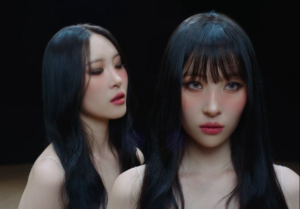
Ah, praise be—spooky season is finally upon us. It’s the month of October; scary movies, questionable costumes and a lot more eyeliner are temporarily mainstream again. It hasn’t always been the season that pop music jumps on the most readily (we have December to look forward to for that), but when it does, the results are, at the very least, interesting. In soloist Sunmi’s first release since last year’s “Heart Burn”, she jumps headfirst into the Halloween-esque, with the genre patchwork that is “Stranger”.
Another example of wildly clashing styles within one song, popularised by groups like Nmixx and Aespa, “Stranger” moves from classic Sunmi mid-tempo synths, through to reggae rhythms, with a spoken-word chant for the chorus. Paired with these disparate and strange stylistic choices is an MV filled with horror imagery, doubling, and no shortage of the knowing camp.
The opening shot of the MV clues us in to the cinematic references to come, though perhaps in an intentionally misleading way. We first see Sunmi, dressed in a green silk evening gown, chanting the spoken chorus of the song in front of a dark, yet grand, staircase in some kind of stately home. It is instantly reminiscent of the famous dress worn by Keira Knightley in Atonement, set with a similar backdrop.
However, the wider shot reveals a second Sunmi, dressed in a contrastingly deep purple and black fur coat, leaning on a bannister in the background and chanting along as well. The outfits and positioning within the frame of these two Sunmis introduces the idea of doubling, and of twisting conventional modes (like a classic evening dress) into something infinitely, well, stranger.
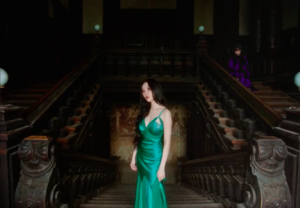
As the MV continues, the film references pile up quickly, as a scattergun of horror allusions that also ends up feeling disorientating. After the opening shot we see a typewriter with ‘stranger’ typed on it, along with multiple others. A page appears to be filled with the same word, and Sunmi slumps over a desk littered with paper. It’s a pretty open nod to one of the most iconic sequences in The Shining, and that is just the beginning.
Veiled dancers in a darkened studio writhe around Sunmi in an echo of Suspiria; scientist Sunmi uses a retro-style machine to awaken a double of herself in imagery straight out of Frankenstein; and her pacing across dark corridors almost feels like the scariest moment of The Exorcist 3 (I won’t spoil it here).
Beyond the film references, the setting also evokes a sense of the gothic. The MV takes place across the rooms of an old, grand mansion, with corridors, ballrooms and staircases aplenty. All of this imagery together is so overtly ‘spooky’ as to become camp, a mode that Sunmi has used before in MVs to great effect. There isn’t anyone in K-pop who can perform the ridiculous with as dead-pan a face as Sunmi, and here she is given free rein to creep, stalk and writhe her way across floors and along hallways.
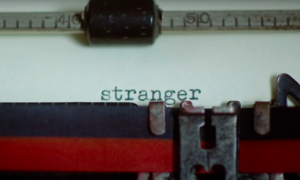
But this horror motif does not end at the film references. Alongside little touches like an abnormally tall clown figure holding her hand, and her body being dragged out of shot during a dance sequence, there is also the integration of a double throughout the MV. From the opening sequences we meet more than one Sunmi, and this doubling emerges in various ways as the MV progresses. She makes herself in the Frankenstein sequence; she is sat around a dining table as another version of herself dances on it; she is an independently-moving reflection in the mirror, and she is even filming herself as she performs one of her dance sequences.
This doubling is naturally unsettling, though the MV presents it in an almost affectionate way at some points. Sometimes the doubles are staring at each other, sometimes embracing. At the end this double is even helping Sunmi in the production of the MV. This very explicit symbol of splitting apart a personality and exploring multiple elements of oneself is echoed in the central refrain of the song.
Mr. Stranger, running into danger
Gotta get to know you
Mr. Stranger, wanna be your angel
Gotta get to know you
The binary idea of danger/angel in this chorus echoes the concept of having two halves that Sunmi symbolises in her doubling. She has even stated herself that the “stranger” of the song is an alternate version of herself, another dimension to her personality. Given this meaning behind the doubling, the moments of interaction and occasional tenderness—when the two Sunmis hug—becomes more poignant.
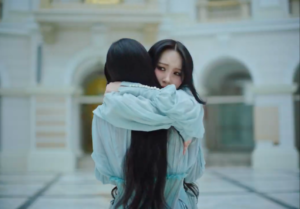
This Sunmi multiplication could also be a visual representation of the multiple genres at play in the song. The monotone talk-singing sections, reggae beats and the standard Sunmi sound are all mixed up together here, with minimal transitions. The effect is sonically jarring and not particularly enjoyable, which is perhaps why the gothic, horror-esque approach is taken in the tone of the MV overall. It is certainly a patchwork of ideas, much like Frankenstein’s monster is a patchwork of, well, people. It’s a clever decision to go with a MV genre that revels in the unsettling and disjointed, and it does align well with the musical sound. It isn’t, however, quite enough to make it work.
The styling used throughout the MV exemplifies the reason for this: while the song is pushing boundaries in its genre-hopping, it isn’t total enough to be coherent. Similarly, the outfits, hair and makeup in the MV do take a step towards campy horror, but seem just a little too restrained to create a fully ‘scream queen’ moment. Sunmi wears all the prerequisites of the gothic visual—black lace, dramatic red, lacy white night dresses—and adds all the necessary posing and facial expressions to ham up their effect. She can scream, smirk or stare wide-eyed like the best of them.
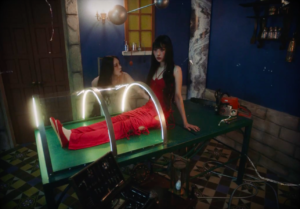
There are even outfits that go further: for example, her red dress in the Frankenstein scene looks almost like bandages. Many of her dresses have fringing, ruffles or slashes that add a distressed edge to her appearance, and there is also a good amount of puffed sleeves and ruffling that nod to Victoriana. However, this is never extended to the hair or makeup, which remains sleek and delicate as always on female idols. It is not as big of a problem due to Sunmi’s acting skills, but perhaps a wilder hairstyle or—gasps—darker makeup could have pushed the MV into a more experimental territory.
The choreography is also slightly underwhelming. Whilst there are standout moments in the staging of the sequences in the dance studio, and any solo moments allow Sunmi to shine, the actual movements paired with the chorus seem remarkably tame. It’s a lot of the same formations of dancers we’ve seen before, and a lot of the poses and leg movements feel familiar. The sections with the dancers’ arms covering and surrounding Sunmi are the exception to this, but knowing her capabilities as a dancer and performer, it feels like the opportunity to be really creative was missed here. She’s shown us how much fun she can have with dance formations in “Tail”, and it feels missing here.
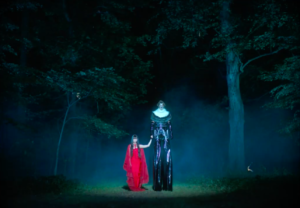
The ultimate irony of “Stranger” is, of course, how strange a song it is. It’s a clever idea to take the dissonance of the song’s styles and interpret that with a horror-inflected MV, and in some ways, it works well. The song may be too odd to coherently work on its own, but the eeriness of Sunmi’s many doubles, and her gleeful revelling in the campy world of a creepy gothic mansion, almost distract from this. If there had been just that little bit more spooky strangeness baked into every level of the visuals and performances, then the MV and song may have made each other completely successful. Nevertheless, it’s still Sunmi’s Haunted House, which, if nothing else, is always camp and entertaining.
(YouTube. Genius. Lyrics via Genius. Images via ABYSS Company.)
0 Comments